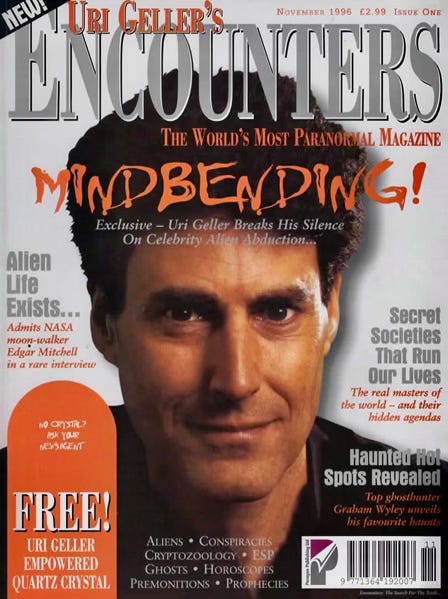Uri Geller is Not A Magician
The New York Times continues Geller’s rehabiliation tour, surreally romanticizing his decades of harmful deceptions
I love watching magic shows, and have seen more magic shows than most people alive — my partner and I sometimes see four or five magic shows a night, and dozens of magic shows each month, through our longtime membership at The Magic Castle, the private 60-year-old city club for magicians in Hollywood, or at other venues around Southern California, like Illusions Magic Lounge in Santa Monica. And a lot of folks are seeing a lot of magic these days, if not quite as many each month as Thomas and I do. By many measures, popular culture is experiencing something of a magic renaissance, with so many magic-themed shows on TV, like Penn & Teller’s Fool Us, Masters of Illusion, Michael Carbonaro on TruTV, Justin Willman on Netflix, and the magicians that pepper every season of shows like America’s Got Talent and American Idol, many of whom go on to major careers in Vegas and elsewhere.
No one watching these magicians believes the magic tricks are feats of real paranormal or supernatural ability, and none of the magicians performing these magic tricks claims them to be feats of real paranormal or supernatural ability.
Enter Uri Geller, the infamous spoon-bender. (They actually call it “Gellerism,” even if there are magicians today who perform it objectively better than he ever did, like Banachek.) For more than five decades, Geller has falsely claimed to possess any number of real supernatural abilities, both to gullible scientists and to his clients, and also to the credulous media, often physically demonstrating seeming paranormal feats that looked just like magic tricks.
He built his valuable brand on this falsehood that he was real, and in the process, offended many in the magic community, skeptics, and anyone else who values the truth and cares when the cognitively vulnerable are being defrauded by charlatans. This offense his critics felt — a kind of moral outrage — has led them to debunking Geller countless times, and yet he’s always remained undeterred. And his unscrupulous deceptions weren’t confined to the stage; I think it was and continues to be his very identity, a dangerously misleading persona ethically identical to conscienceless faith healers and psychic charlatans who knowingly dupe the gullible for personal gain.
I’ve only met Uri Geller twice, and I can confirm others’ accounts: he is a beautiful huckster. When I first met him, he made me feel like the center of the universe — he was so warm and attentive, even affectionate, and he honestly seemed like a genuinely nice guy. I found him to be extremely likable. Even though I knew his history of destructive fraud and deceit. It should be no wonder that someone with his history could be so beguiling.
Considering the extremely well-documented history of Geller’s harmful chicanery, I found it surprising that the New York Times yesterday profiled Geller very positively, but maybe I shouldnt have been, knowing his charms. But what really suprised me is that the Times piece lauded him as nothing more than a redeemed variety entertainer, reporting that he has lately largely been embraced by the magic community. The profile claims that the magic world has finally “ended its 50-year grudge” against him.
While that narrative makes me uncomfortable, there is certainly some truth to it. Geller has, in fact, been warmly received in recent years by much of the magic community. I remember at one big magic convention I went to a few years ago, Geller was almost avuncular in the way he was trying to guide young magicians in their careers (guide them to the dark side, I’d say). And after Geller gave a rousing keynote clucking about how great he’s been at publicity over the years by lying about his purported supernatural abilities, and how richly he’s been rewarded for it, he got a sustained standing ovation by the many hundreds of magicians in the audience. It was as if the magicians sort of envied his chutzpah and brazen skullduggery — if only they could get so rich and famous just by doing magic tricks!

That he has been so warmly received in the magic community in recent years is remarkable to me because Geller is not in any sense a magician. He is neither a good magician, nor is he even a bad magician, as some of his old magician-critics have claimed. Bad magicians are magicians who don’t perform their magic tricks very well. But Geller was and is a charming con man who did not get rich and famous by doing magic tricks, but by conning hurting people susceptible to his fictions. Yes, at times he used quasi-magic tricks in his cons, but very often he didn’t, just using bluster and bravado instead.
That the magic community, with some notable if rare exceptions, has recently turned a blind eye to Geller’s history is not at all due to the fact that Geller has finally confessed to being a fraud, and to bilking his victims out of literal fortunes over the years, because Geller has never confessed to this, nor has he ever tried to make good, nor tried to make his victims whole. Instead, I think magicians have welcomed Geller into their community because magicians as a group are charmed by his personality and especially by his celebrity — magicians are nothing if not starfuckers, and ethics aside, Geller is a bona fide very charming celebrity.
Curiously, the New York Times article treats James Randi as little more than a footnote, dismissing him as just spewing “vitriol” against a poor Uri Geller, who is portrayed as just an “almost innocent” fellow entertainer, a mean-spirited and joyless Randi tilting at the inocuous windmill of Uri Geller. But Randi’s vitriol was in fact deeply principled. He cared deeply about the people Geller was hurting with his scams. (Yes, Randi’s vitriol was also deeply personal, for a number of obvious reasons this New York Times reporter doesn’t seem have uncovered, inexplicably.)
Geller’s history of fraud is surreally romanticized in the New York Times profile — he’s audaciously portrayed as a mere magician somehow performing his deceptions in the public interest! We are told that poor misunderstood Uri Geller is only aspriring to help us question “our relationship to the truth, and daring us to doubt our eyes,” just as a skeptic or science educator might. Geller is portrayed as merely wanting to inspire “a kind of wonder” among his audiences, as if he were some kind of Carl Sagan encouraging people to feel awe about the mysteries of the universe.
But Geller wasn’t — and isn’t — any sort of noble Carl Sagan type. He was a con man who hurt people. And his scams were not just confined to lucrative pseudoscientific oil prospecting cons, as the Times article suggests. In the 90s, Geller’s magazines in England were promoting things like dangerous spiritualistic healing of very physical medical ailments. Found on the magazine racks throughout the country (I bought one in person on my first trip to London in 1996), issues were packaged with “Uri Geller Empowered Quartz Crystals,” with step-by-step instructions for supposedly curing very real diseases. He didn’t perform benign magic tricks merely refusing to disclaim them as mere tricks. In my opinion, he was a spiritualistic fraud. And continues to be.
Andy Nyman, the busy movie actor and quite brilliant creator of magic (formerly on magician Derren Brown’s creative team), rationalizes his support for Geller in the Time’s article by saying that “if he’s fraudulent, there are bigger lies and bigger frauds out there that are far more damaging.” It is certainly true that there are con artists and charlatans in the world who are even more harmful than Geller, and it’s also certainly true that skeptics sometimes inconsistently aim their ire. But this from Nyman is an impressive kind of whattaboutism: the existence of a more harmful fraud doesn’t at all negate the very real harm of a slightly less harmful fraud.
Geller’s enduring presence and rehabilitation isn’t a testament to his genius, although he may well be a genius (or at the very least, a highly socially intelligent performer with no scruples!). Instead, his ability to remain in the headlines and to charm new generations of unduly credulous reporters is a disturbing reminder of our collective susceptibility to deception. Geller’s stubborn refusal or inability to morally develop, to step out of his deceitful persona, is not laudable. It’s tragic. As likable as I found the guy, I don’t think his reputation should be salvaged, it should serve as a cautionary tale.
In the end, the Times’ romantic portrayal of Geller is one of his greatest deceptions yet. But I won't be fooled. Will you?





One reason for Randi's animus is that Geller sued Randi many times, for telling the truth.
Now Geller is jumping on the hot 'UFO Disclosure' bandwagon, claiming to have seen dead aliens in an Air Force freezer. The Tik Toc video of a living alien he is showing here has previously been revealed to be a CGI creation.
https://badufos.blogspot.com/2023/07/more-credible-eyewitness-testimony.html
Robert Sheaffer
For context, let me start with stating that I'm am Israeli professional Mentalist (I do this for a living for over 30 years).
I agree with every line in the above article, Uri Geller is a big Fraud.
I had a chance to meet Geller on a few occasions, he is a very smart charming person. My problem with him is not so much the fact that he pretends to have superpowers, at the end of the day, people want to believe and no matter what you tell them, faith is stronger than facts (unfortunate reality), so even if the guy stated he has powers and people choose to pay to go see him perform, that's ok with me, after all, I tell my audience I don't have any powers and after the show, I always get those that choose to believe I have powers.
I actually uploaded Geller when he took all that money from oil companies, good for him, they can afford it and if they are stupid enough to believe that a charlatan can pinpoint on a map where they can find oil, then they deserve it all.
I even think that for some desperate people with serious medical conditions, sometimes hope and faith can actually cure or alleviate pain, this is why "Shamans" and "Virgins" are still a thing and some people still will swear to it, including some of my wife's family in Argentina that think that as a result of a visit to the "Virgin of Guadalupe", they managed to conceive a healthy baby (that off course is named Guadalupe).
Back to Geller, the moment I really lost all respect for the man was when in 1995 on a news show in Israel, he appeared there claiming he will help a desperate mom to find her son that got lost in a backpacking trip in Asia for months (or maybe years I can't remember). He opened a map of the world, closed his eyes, and started waving his hand on top trying to connect with her lost son.
Promoting yourself at the expense of a desperate mother is deplorable. No matter that Geller admitted in front of magicians that he is full of it, will never make this right in my view.
Zero respect for Uri Geller.